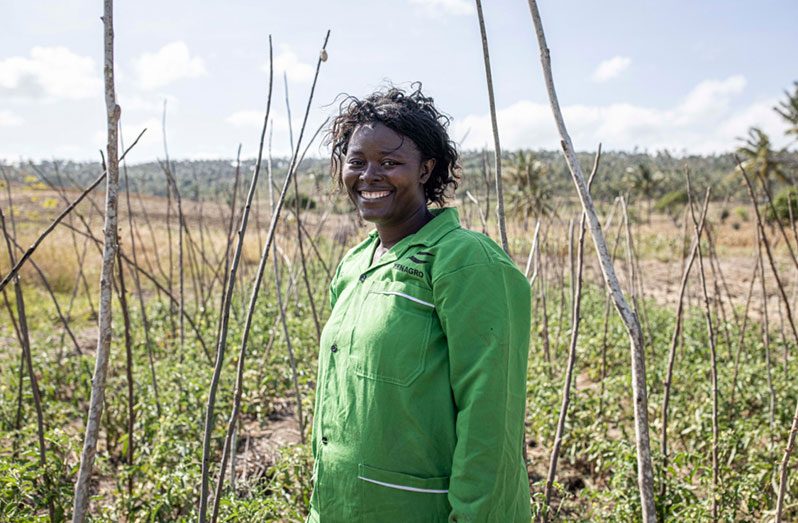(FAO) SHE smiles widely and her face beams with pride. Seeing Agnes Rehema Chisiwa in her garden of carefully selected and curated tomato plants, there is no doubt that she is proud of what she has accomplished.
Agnes is now the chairperson of the Juhudi Farmer Field School in Kilifi South, Kenya. She has become a visionary entrepreneur and a dedicated trainer who enjoys sharing her knowledge with other local farmers.
Through her training, she focuses on agricultural business development and prepares both women and men to challenge local traditions and customs that hinder women from having an equal say.
“We, women farmers, face so many challenges because of the several roles we play,” says Agnes.
She added: “Women bear all the burden of family responsibilities, from the time they wake up until they go to bed. Women are expected to wash dishes, clean the house, fetch water from the well, carry pregnancies, attend school meetings and cook for their husbands and children. At the same time, they also need to attend community meetings and work on the farms.”
Until a few years ago, Agnes had difficulty to discuss financial matters openly with her husband, and they never consulted each other when making decisions, which is true for many families in rural Kenya.
“Whenever my husband got some money, we would never talk about it,” Agnes lamented.
She said: “He got his money and I got mine. I would buy a packet of flour and while coming home from work he would also buy a packet of flour. Then, we would end up having two packets of flour but no other food items for the meal, like vegetables.”
Things started to change in 2020, when Agnes attended an FAO-organised training through the Women’s Empowerment Farmer Business School (WE-FBS), an innovative initiative that promotes gender equality and economic empowerment of rural women in the areas of agriculture and food production.
It reinforces the capacities of female and male farmers to create profitable agricultural enterprises and, at the same time, transforms gender relations in households, communities and markets by encouraging participants to critically reflect on and discuss gender challenges, dig into their causes and come up with possible solutions.
Husbands, wives and mature children also develop a five-year visioning plan together on their family and business affairs.
Agnes was among the 100 facilitators from the Kilifi County who participated in the WE-FBS training provided by FAO in partnership with the Government of Kenya, through the Gender Equality and Women’s Empowerment in Agriculture, Food Security and Nutrition, an initiative funded by FAO’s Flexible Multi-Partner Mechanism (FMM).
“Following the WE-FBS training, I can now sit with my husband and plan together. We agreed that one of us should buy flour while the other buys vegetables. Same thing for our children’s school uniforms. I buy the shirts, and he buys the shorts. So, right now, all is well between us thanks to the training,” Agnes said.
LEARNING ABOUT MARKETS
While encouraging family dialogue, the FAO training has also helped Agnes and other group members to develop their farming skills and better understand how to leverage markets.
Using the knowledge from the training, Agnes conducted a market survey which showed a great demand for tomatoes and other vegetables in the local market due to the prevailing drought in her county.
As a result, she started growing them and now she expects to earn more income from selling these crops at the market.
“Before we produce crops, we must conduct a market survey. We should not plant crops that do not have a ready market. The training was a watershed for us,” Agnes said.
She added: “We must take into consideration what products are available in the market from the buyers’ perspective. We need to ask them what they would be interested in buying and at what prices.”
In partnership with World Vision International, the WE-FBS initiative has prepared 15 master trainers and has built the capacities of 257 farmer facilitators who have, in turn, transferred the WE-FBS skills to further 2,678 farmers. The expectation is to reach 5,200 women and 1,300 men farmers by the end of the pilot phase in 2022.
“By involving both men and women, the WE-FBS approach gives space for unpacking gender norms while strengthening entrepreneurial skills and capacity to improve their farm business activities, engage in lucrative value chains and pursue market opportunities,” FAO Representative in Kenya, Carla Mucavi, said.
She related: “The approach also includes different tools to tackle negative norms that hinder women and men from improving their wellbeing and attaining their full potential.”
“Agnes is much more than a tomato and vegetables grower. She is a powerful woman who has overcome deep-rooted, socio-cultural norms,” said Queen Katembu, FAO WE-FBS Coordinator in Kenya, who trained Agnes and saw her speaking up more at home and in the community.
“Thanks to the training, she has become more skilled in planning expenses, joined a Village Savings and Loan Association, opened a bank account and developed a good basis to obtain loans.”
While her business grows, Agnes knows exactly what she wants. “I have a target and a five-year vision of what I plan to achieve. For instance, right now I need a [water] pump and I have started saving to buy one. Now, I save with a target. I know I will get that pump thanks to my savings.”
Farmers who have taken the WE-FBS training are applying what they learned to other farming initiatives in the country. These trainings are also being rolled out in Cambodia, Senegal and Uganda, aiming to enhance women’s equitable participation in farming and close the gender gap in agriculture.




.png)









